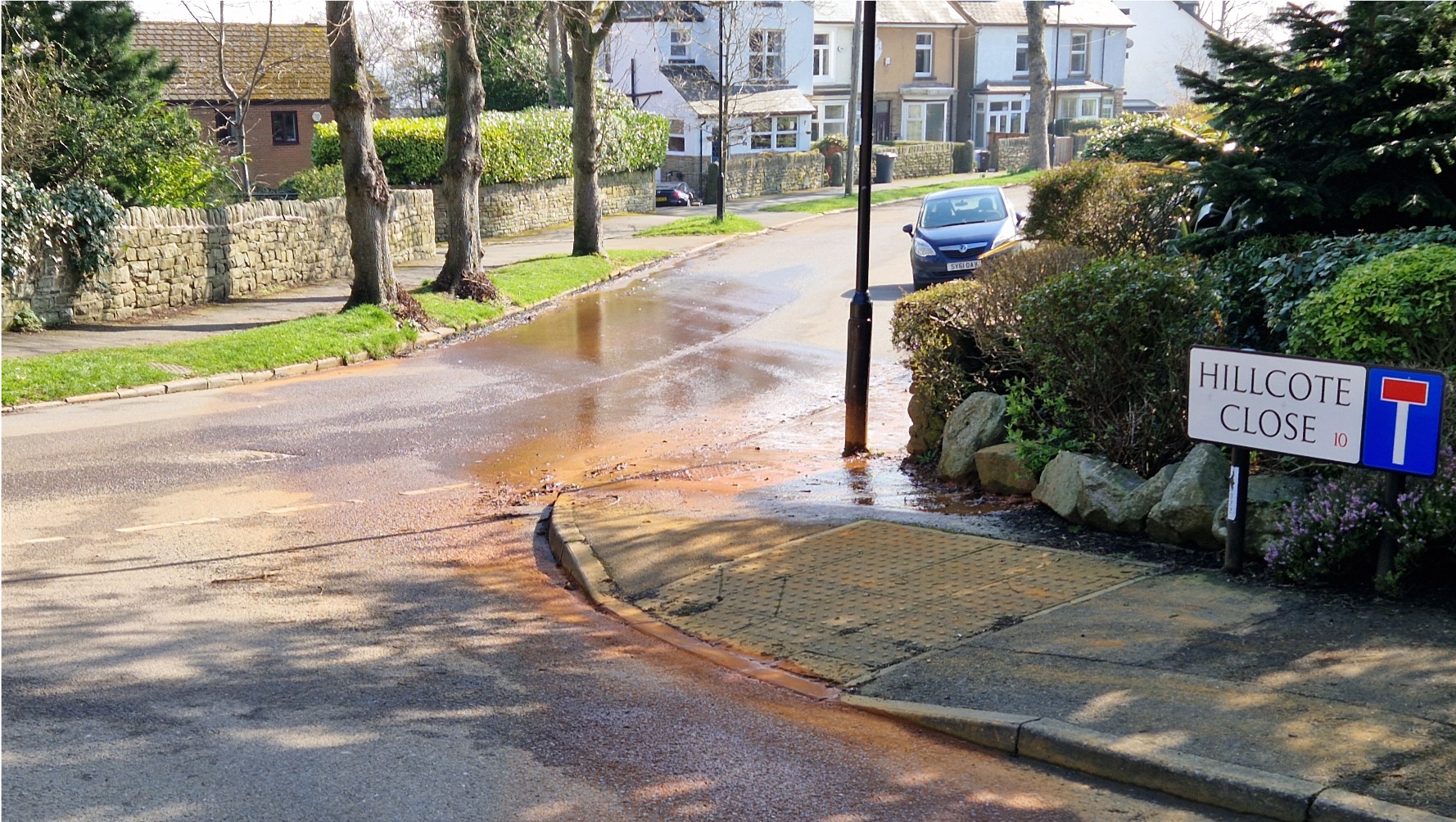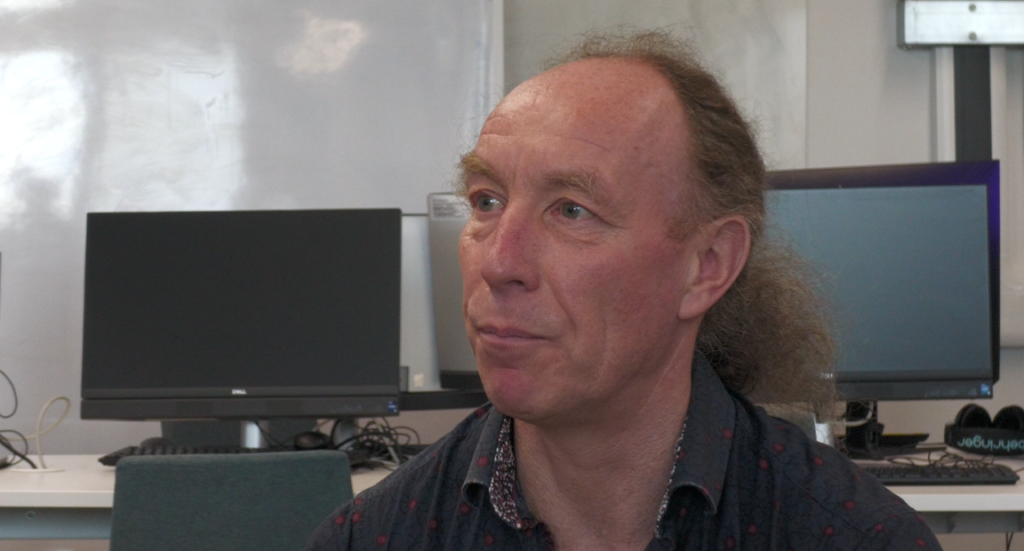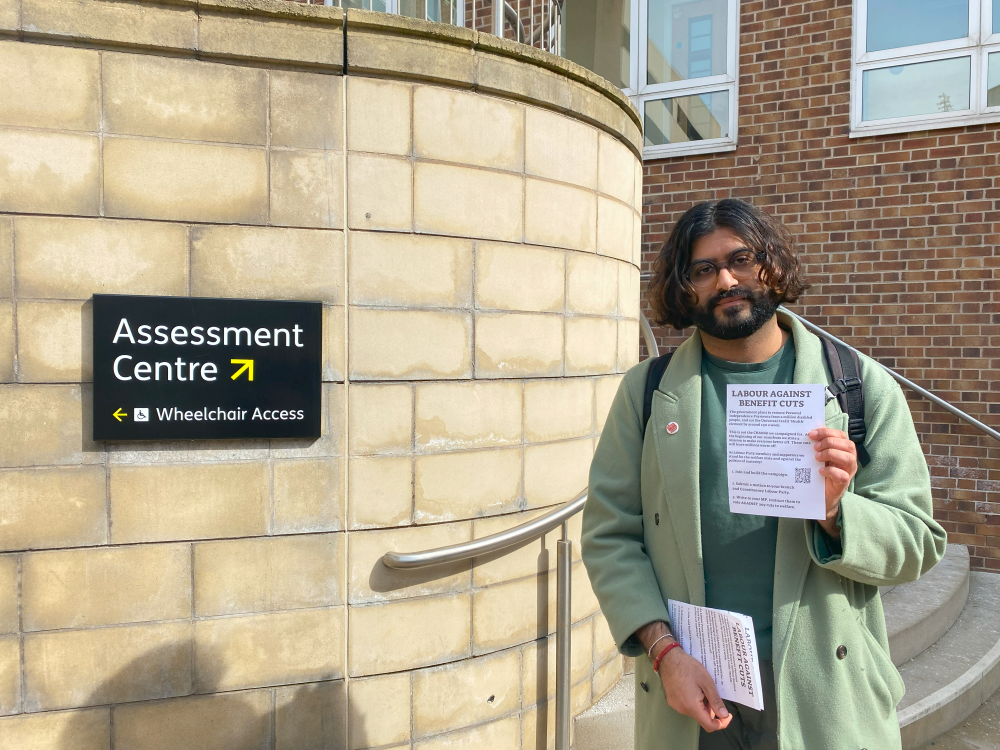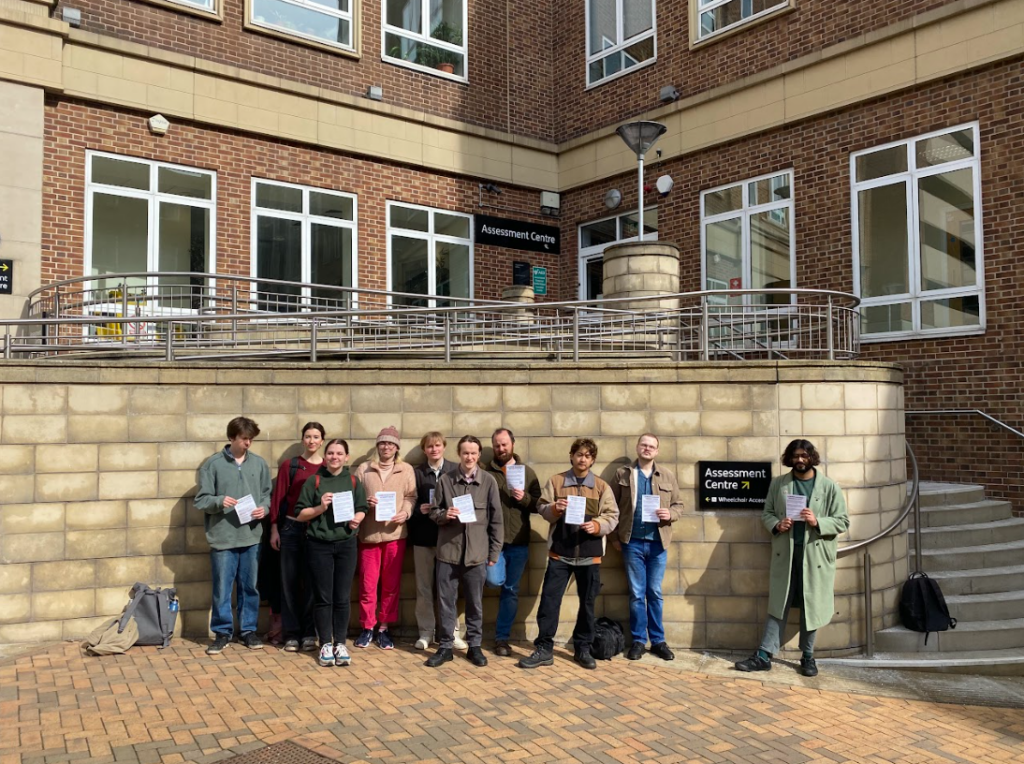
Sheffield student worries “financial lifeline” will be gone under PIP reforms
For Thomas Atkin-Withers, just getting through each day is a battle. They suffer from complex neurological conditions, are in constant pain, but to make matters worse, they are now frightened that the financial lifeline they receive is about to be taken away.
The 21-year-old disabled student diagnosed with autism, suffers from depression, chronic fatigue and hypermobile joints, and receives exactly £737.20 a month from their Personal Independence Payment (PIP) plan, which just about covers their rent, water and electricity bills, food and medical costs.
But they are worried the government’s latest overhaul of disability benefits mean they will be left financially destitute.
“As someone with a lifelong disability, this isn’t going to get better for me,” says Thomas, from Beauchief. “It’s only going to get worse, both for me and for my family.”
Thomas’ hypermobility is debilitating. It leaves them with severe pain in their joints, especially while walking or doing basic activities, including walking, cooking or even showering. Thomas needs their husband’s help to get washed and help putting their clothes on, because there are days they cannot even get their socks on.
“It’s not easy, and the fact that I’m even here is a miracle some days,” they say.
Thomas’ parents are also disabled and receive PIP. Their dad has Multiple Sclerosis (MS) and mum has debilitating chronic fatigue syndrome.
A PIP is a payment plan designed to help disabled people with long-term physical or mental health conditions or disabilities. It is based on a points system that assesses a person’s ability to perform daily living activities and mobility tasks, with a score of 8 or more points for either component leading to a standard amount (roughly £73), and 12 or more for enhanced amounts.
Thomas, who is currently studying an MA in Urban Planning Integrated at the University of Sheffield, has been able to manage their finances with the help of their husband, Avery, juggling the amount they receive from PIP and Universal Credit.
“At the moment, at least we don’t have to worry about getting evicted,” says Thomas. “My rent is covered, so is my water, electricity and travel costs.”
They strongly disagree with the government’s rhetoric that the current system is broken because of ‘overdiagnosis’.
“I feel like my body is constantly trying to kill me,” says Thomas. “It’s not easy, and the fact that I’m even here is a miracle some days. This isn’t an overdiagnosis. This is a crisis based on the conditions our current society inflicts upon people.
Thomas takes a mix of medication for their disabilities, including paracetamol, ibuprofen and voltarol. Without these, they say they would not be able to walk properly, would suffer from constant migraines and suicidal thoughts due to their depression and anxiety.
They believe it’s insulting that the general rhetoric around disabled people is that they are ‘scrounges’.
“We’re not spending thousands of pounds on holidays,” says Thomas. “We’re not jetting off to far flung destinations or buying luxury cars. We are living, we are scraping by - that’s what PIP allows us to do.”
In December last year (2024), after a fall, and because the texture of their connective tissue is so flexible - they tore all the tendons in their feet just by walking.
Thomas couldn’t even take a break from university classes afterwards as they were worried about falling behind. Instead Thomas returned to university the next day with their feet stuffed into crocs because they wouldn’t fit into their shoes due to heavy swelling.
Commuting is a huge issue for Thomas, just getting on buses is problematic. “If a bus is full, I have to wait for the next one, because going up the stairs on a bus has become risky enough to extremely injure me,” they say.
This is why they say PIP is essential for someone like Thomas. The PIP covers the cost of taxis to and from university when they cannot take the bus or if they feel unwell enough.
“Without PIP, I wouldn’t be here, without PIP I would not have been able to live,” says Thomas.
Thomas disagrees with a lot of things listed in the green paper which was released last week – such as face-to-face disability assessments– but there are a couple of things they think are essential, including the scrapping of compulsory work capability assessments, which they believe are dehumanising for disabled people.
They added that the move to allow disabled people to go back to work without taking away their benefits is also a very positive one.
“PIP cannot be touched,” in Thomas’ opinion, who feels strongly that the financial aid should not be taken away. “I say this as someone who gets that there isn’t that much money available, but the government has to find other sources of money. We need to tax the rich higher than the amount we do now so we can take care of our disabled population.”
Thomas also believes PIP barely allows some people to survive. “It isn’t enough,” they say. “There are people on PIP who still have to count pennies before they see their friends, who cannot afford basic necessities like food and heating. PIP is a baseline.”
Thomas also explained how difficult it is to navigate the current benefits system. They said that there is no easy guide to finding the right kind of benefits for different disabilities, despite several voluntary organizations trying their best to help.
“It isn’t signposted clearly,” they say. “It is like trying to find your way through a maze with a blindfold over your eyes and noise-cancelling headphones on. That is a symptom of a failing government and a failing nation.”
Thomas volunteers for a charity that helps young people and disabled parents with caring needs, but believes that in a welfare state, the fact that these organisations exist are the signs of a failing government.

Fulwood residents endured six week wait for leak to be repaired and now face an even longer delay
Residents across Fulwood are facing major leaks as they wait for Sheffield City Council and Yorkshire Water to decide who is responsible for the repair.
Martyn Holland, 63, lives in the house on Hillcote Close where the leak is coming from and has reported this to both Sheffield Council and Yorkshire Water but claims both are denying responsibility for the repair.
He said: “When I told Yorkshire Water, they told me that the pipes aren’t on their maps so they couldn’t do anything.
“Sheffield City Council told me that it’s not a highway, so they can’t do anything about it.”
Mr Holland said he knows of at least 12 residents who live around the area have lodged complaints as well.
He said: “It's horrid to look at, people have to walk through it, the water has turned children’s shoes, car tyres and dogs feet orange.”
Mr Holland gave credit to Yorkshire Water who he said were the first ones to send someone out to investigate last Thursday, but the leak is still on-going.

Yorkshire Water and the Sheffield City Council have both been contacted for comment but are yet to reply.

Thousands run Sheffield Half Marathon to raise funds for charity
Yesterday saw over 6000 runners take part in Run For All’s yearly Sheffield Half Marathon.
The 13.1 mile (21km) route began in the city centre, before runners ran to the Norfolk Arms in Ringinglow and returned back via Ecclesall Road. Overall the race had a 259m elevation gain.
Tommy Power, from the Hallamshire Harriers placed first this year, with a time of one hour and eight minutes. The fastest female runner was Claire Frankland, who placed 37th with a time of one hour and seventeen minutes.
Participants ran for a variety of charities, with over £17,000 being raised for St Luke’s Hospice.
Susan Glaves was the final participant to cross the finish line, she was raising money for the children's hospital.
She said: "Everybody in Sheffield knows how much the hospital [does] and what it means to everyone [in the city]".
While some sported their charity t-shirts, others went for a more high-profile outfit. A group raising money for the Golddigger Trust, a youth charity which runs wellbeing events for young people, opted for banana and minion outfits.
They said: “We really want to raise the profile of the charity, we wanted to do something that would mark us out and make people recognise the Golddigger Trust and the amazing work that they’re doing”

A group of teenagers also ran to raise money for the anti-knife crime charity Always An Alternative in memory of the Sheffield teenager Harvey Willgoose who was stabbed in school last month and later died in hospital. The group raised over £3,500 for the cause.
Speaking to the BBC, Caroline Willgoose, Harvey’s mother, said: “Harvey would be so proud of all of his friends getting the message across.
"Things like this are uplifting and getting us through this horrific time. I’m so proud of them. The kids are just amazing.”
Next years half marathon will take place on 29 March 2026 and you can sign up now.

Mobility scooter user hits out at train companies for adding unnecessary stress to his journey
A Sheffield-based mobility scooter user has claimed that he is not given the same access as wheelchair users on trains throughout the UK.
Jamie Clarke, 53, is a computer engineer who uses the train to attend meetings all around the UK for work, and feels that mobility scooter users don’t receive the same treatment as wheelchair users.
He would like to see something change in all 23 train companies throughout the UK.
Jamie said: “I need my scooter. Even though I can walk, I can’t walk for very long due to my condition. Nine times out of 10 there is no issue but on that tenth time I feel like I have to fight for my right to board a train with my scooter.
“My wife is in a wheelchair and experiences no such confrontations when boarding any train. I mean I get that some scooters are too big to find room, but for some people such as myself who need their scooter to get around I can’t just leave it behind. I just want to be treated equally.”
In addition to buying a train ticket, Jamie has to apply for a permit with certain train companies, and even then this is sometimes not enough.
He said: “Even though it doesn’t take long to apply, just an extra 5 minutes of my time, it’s the fact that there are too many train companies with their own policies and their own forms to fill in to apply for a permit. I just feel like there should be a single place to apply for a permit instead of going through all the individual companies.”
The Blue Badge Insurance’s website explains that even though most mobility scooters are allowed on trains, there are some instances when access for scooters might not be possible, for example, when the gap between the train and the platform is large, and there is a shortage of staff available to give assistance.
Most train providers in the UK have a weight limit of 300 kg which includes the weight of the user. Additionally, the scooter must be less than 1.3 metres long, and some train companies require users to apply for a permit.
Blue Badge Insurance have some helpful tips for mobility scooter users, including booking in advance, leaving plenty of time before travel, and having any relevant disability documents to hand.
The Department of Transport, which oversees all transport in the UK, outlines on its website: “All rail companies and stations must comply with the Accessible Travel Policy (ATP) that states that all stations should provide assistance when trains are scheduled, if a station is inaccessible then the person should be given assistance to the next available accessible train station.
“As a disabled passenger, if you are unsatisfied with the rail service provided, you should contact the train operator that you used. If you are not satisfied with the response, you can then contact the Independent Rail Ombudsman.”

Parents gather in Sheffield to celebrate Down’s Syndrome Awareness Day but more needs to be done to receive support
Bright coloured picnic blankets adorn the grass, frisbees are thrown back and forth, while infectious laughter echoes around Forge Dam Park, as families from the Sheffield Down’s Syndrome Support Group gather to celebrate their children’s achievements.
It’s evident there is much to embrace, but the parents who came together as part of Down Syndrome Awareness Day believe more needs to be done for their children to feel part of everyday life, so they can enjoy the simple pleasures their peers take for granted.
Bess, 39, a stay-at-home mum, looks on at her nine-year-old son, Amos, with pride but feels for years she has battled against medics telling her all the things her son could not achieve.
Amos goes to a mainstream school and attends Beavers. He is also exceptionally good at bowling, and recently came second place in a competition.
“Amos is empathetic, but his communication, and the way he makes someone smile are not reported in the education system,” says Bess, from Sheffield.
“It would be nice for us as a family if the educational achievements are not only academic but also holistic, and include all those bits that you can’t achieve through tests.”
Although Amos has found groups he can attend, this has been a struggle for his parents, who have faced barriers in helping their son feel included.
“The main challenges now are finding places where Amos can belong, where people aren’t afraid of him having Down's syndrome,” says Bess. “He has delayed development so is not your typical nine-year-old. We had to fight hard to get Amos the support that he needed, I think the education system is a bit behind on supporting children like Amos.”
Bess knows what Amos learns educationally on a weekly basis is below the national average for an average child of his age, but she believes that no matter what her son succeeds in should be celebrated and acknowledged. Bess feels strongly the education system and mainstream schools need more training to celebrate these milestones.
Another mum, Tracy Tonks, who attended the get together explained one problem many expectant parents of children with Down’s Syndrome face, is the fact they are constantly told what their unborn babies won’t be able to accomplish.
When Tracy, 49, who is originally from Sheffield, was told her daughter, Esme, would have Down’s Syndrome she “grieved through the entire pregnancy” after medical professionals provided a long list of things that her child could not achieve.
“Nobody actually said to me that I was just going to have a baby,” she says. “I am ashamed of how I grieved now,” she says. “The information that I was getting was all wrong. They kept telling me she wouldn't be able to do anything, but she is living her best life now.”
Tracy, who now lives in Nottinghamshire, has found it a struggle to find the same amount of support that she received in South Yorkshire. Esme needs occupational therapy, however, she does not “tick enough boxes” to receive it in her current hometown, but was offered to her when she lived in Sheffield. Tracy believes the number of children with Down’s Syndrome needing support exceeds the amount of funding received by the health and education sectors.
“It feels like I have to beg to get help, which is scary,” she says. “Everything just seems to be a fight.”
Tracy explained, although Esme’s mainstream school has a lot of children with special needs, her daughter doesn’t get the extra help she needs with reading and writing.
The mum says it’s the Sheffield Down’s Syndrome Support Group which has been a lifeline. She joined when she was pregnant, went to a picnic two months before her daughter was due, and has been a part of it ever since.
“This support group saved me,” she says. “It has changed my entire perspective.”

Saurabh Sinha, 55, is a former neurosurgeon from Sheffield, and dad to Rory, 18, who also has Down's Syndrome. He believes it is important to train medical professionals on how to communicate to children with learning disabilities.
He said it is crucial to be positive when delivering the news of a Down’s Syndrome diagnosis to parents. He explained beginning a journey of parenthood with all the negative aspects can scare parents and these children are just as capable of achieving all the things that a perfectly healthy child can
“Often even before the child is born or diagnosed with Down’s parents are told horrific stories about what their child can and can’t do,” Saurabh says. “Telling the parents about medical complications is important for their health, but you can never tell them what their child can and can’t achieve.”
Rory had cardiac surgery as a child but has gone on to achieve several gold medals in basketball, plays tennis, and trampolining.
Saurabh believes being a parent to a child with Down's has made him a better doctor, and because Rory was sick when he was younger, he could communicate and relate to other parents and help them through their journeys.
Like Tracy, he believes more could be done to help their children. “Special needs education is not the best in Sheffield,” he says. “Inputs from social care are not great in the city, and have been inadequate on several occasions with minimal accessibility.”
Tara Elsmore, 37, is a diabetes specialist nurse and mum to four-year-old Grace, who also has Down’s Syndrome. Grace was born during the Covid pandemic in 2020.
She started learning Makaton, a form of sign language, while she was pregnant and was told her daughter would be born with Down’s Syndrome. She is now able to communicate with her daughter, who suffers with hearing difficulties and does not quite like wearing a hearing band.
Stanley, a cheerful 15-year-old teenager, was diagnosed with Down’s Syndrome when he was born. He goes to a special school where he receives speech therapy, and enjoys sports, as well as cooking
According to his mum, Sarah Hooker, 54, her son is very social and enjoys being with his family and friends. He loves learning about the history of King Henry, and “being on the telly”.
Sarah is the fundraising manager of Sheffield Down’s Syndrome group. She explains securing support for her son, since he started secondary school at age 11, has been increasingly difficult due to a lack of funding for the educational system. But the support group has helped her meet other parents and create speech therapy groups for their children.
“Stanley is just like every other teenager,” Sarah says. “He has opportunities to be independent and understand that he can have a separate life than us.”

Common misconceptions about Down’s Syndrome:
“People often think that children with down’s are not very bright,” says Tara Elsmore. “They think that children can’t understand them, which is wrong, they are perfectly capable of communicating back. Grace is very clever.”
Bess, Amos’ mum, expands: “Each child with Down’s Syndrome has 47 chromosomes, and 46 of those are half mum and half dad, they are more like their parents than they are someone else with Down’s Syndrome.
“Sometimes we put kids with additional needs in a box, and think they can’t do normal things, but you just need to find that one thing that they are super good at, and let them try.”

Sheffield Children’s University launches SEND inclusive song
A new song created by a children's charity in partnership with a local college has been translated into Makaton sign language.
Sheffield Children’s University worked with staff at The Sheffield College to produce the new song ‘Anything I Want To Be’.
To enable children with SEND to participate in the song, a member of staff from the NEXUS academy trust group of schools translated the words of the song into Makaton sign language which features in the video for the song.
Makaton is an alternative communication system which uses signs and symbols alongside speech and written words to support communication.
Katie Hamshaw, senior project coordinator for Sheffield Children's University referred to the song's release as “a dream come true”.
She said: "Working with the incredibly talented team at The Sheffield College to bring it to life has been such a joy, and the addition of Makaton - thanks to Nexus Multi Academy Trust - means our message of limitless learning can reach even more children and young people.”
Councillor Dawn Dale, chair of education, children and families policy committee, said that the song “captures the spirit of Sheffield Children’s University and encourages children to follow their dreams.
She added: “I would like to extend my sincere thanks to the staff involved in creating this song - especially for thoughtfully incorporating Makaton sign language into the chorus, ensuring it's accessible and enjoyable for everyone.”
The official launch of ‘Anything I Want To Be’ took place at the Sheffield Children's University Gold Awards Ceremony on 18 March at Sheffield Hallam University involving a live performance encouraging the audience to join in with the Makaton chorus.
Ash Muscroft, music programme coordinator and tutor at The Sheffield College helped to develop the song alongside industry colleague, Andrew Frost.
Mr Muscroft said: “I feel honoured to have co-written and performed it at such an exciting awards ceremony. It was also great to showcase our brand new state-of-the-art equipment.”
The song aims to inspire young people and have high aspirations in whatever career path they choose.
Mrs Hamshaw said: "I really hope it becomes a lasting reminder for all our families that learning goes beyond the classroom.”
The song will be officially released by The Sheffield College on major streaming platforms in Spring 2025 and shared across the Children's University network.

University of Sheffield students vote to support staff strike action following referendum
A campaign group is looking to form a strike committee of students following a referendum which revealed a majority vote in students supporting staff industrial action.
The Anti-Cuts Coalition is made up of staff and students at the University of Sheffield who oppose the cuts being made to staff and resources.
Charlie Thomas, a member of the coalition, said: “The referendum result is a clear indication that students reject the cuts."
He added: “The cuts will make life at the university worse and more stressful for everyone who studies here.”
Ben Golding, a foundation year student, chose Sheffield because he wanted to study Physics with Philosophy. He was informed that the course would be cut after the UCAS deadline.
He said: “It’s frustrating not only to have my chosen course pulled, but with no time to do anything about it.”
The referendum was held 17-20 March by Sheffield SU alongside the student elections in response to a university management scheme pursuing cuts to modules, courses, staff and resources.
Over 400 jobs could be lost through voluntary or compulsory redundancies, as the university aims to cut £23m in staffing costs over this and the next academic year.
Mr Thomas said: “The first immediate impact of the referendum will be the UCU ballot.”
The Sheffield University College Union (UCU) Ballot for industrial action is open until 31 March.
Robyn Ortifelli, Sheffield UCU President, said: “Staff and students are the heart of this institution and now is the most important moment for us to stand together and demand better.”
Results of the referendum were publicised to reveal that 2217 students voted ‘yes’ to the SU supporting university staff taking industrial action, while 455 voted no and 168 abstained.
In addition, 2230 students voted ‘yes’ to the SU expressing ‘no confidence’ in the University Executive Board, while 277 voted no and 195 abstained.
In the run-up to the referendum, Anti-Cuts Coalition Sheffield held a protest at a university open day on Saturday 8 March.
The university has said that it is taking a number of considered actions in response to the challenges facing the higher education sector and regularly reviews the courses on offer to ensure they meet the needs of students, employers and wider society, and often make changes to reflect this. A small number of programmes have five or fewer students, and are consequently being reviewed.
It has also stated its responsibility as a University to deliver a consistent, high quality student experience, and to offer courses that meet market demands.
A spokesperson for the University of Sheffield said: "At the University of Sheffield, we are taking a proactive and strategic approach to the current challenges facing UK universities so that we can continue to deliver the excellent education and student experience for which Sheffield is renowned.
“We continue to navigate these challenges responsibly and transparently. We deeply value student voice and continue to engage with our Students' Union and students on these and other important matters."
The Anti-Cuts Coalition is holding a meeting on supporting staff strikes and fighting university cuts on 1 April.

Sheffield’s F4 driver unveils new car with Made in Sheffield
A teenage rising star of motorsport has revealed his new car for the upcoming F4 season with support from Made in Sheffield.
Rowan Campbell-Pilling, 18, celebrated the occasion last week outside the town hall with both the Lord Mayor Jayne Dunn and The Master Cutler Phil Rodrigo.
Made in Sheffield's support means that Mr Campbell-Pilling can showcase the prestigious mark on his race-car, helmet, and suit for his upcoming Formula 4 season.
Made in Sheffield launched in 2005 and is the result of a partnership between the Sheffield Chamber of Commerce, The Company of Cutlers, and Sheffield City Council.
Traditionally, it gives manufacturing companies the opportunity to display the mark and showcase their heritage, and is described as "a symbol of the City region's ongoing commitment to quality and excellence". However, in recent years, the Mark is shown by companies in sectors that go beyond traditional manufacturing, being bestowed in other areas such as theatre.
Charles Turner, chairman of Made in Sheffield, said: "We are delighted to support Rowan and, through him, raise awareness of both this City's sporting legacy but also the manufacturing industries of this region.
"Made in Sheffield is about quality products, and these require skill to manufacture, so supporting young talent from the region is incredibly important to us. Rowan shows that success in motorsport, like engineering, needs hard work and passion so we are proud to celebrate with him."
Speaking about being able to show and wear the mark, Mr Campbell-Pilling said: "I'm honoured to be able to place the Made in Sheffield Mark on my car, helmet and race suit for our upcoming season. To be able to represent the Steel City on this level means so much to me."
He began karting at an early age, having success in the Daniel Riccardo Series (DRS), and being crowned its youngest-ever champion at 14 years old in 2021.
In 2024, he saw great success in his debut F4 season, finishing in a podium position in 21 of his 30 races.
His second season begins in April, where he will be driving for the JHR Developments team, which is located less than 10 miles from Sheffield in Dronfield.
Mr Campbell-Pilling said: "Throughout my journey, in karting and now in F4, as I pursue my dream of reaching the pinnacle of motorsport racing, I have always been proud of my Sheffield roots.
"As I continue to represent Sheffield and South Yorkshire in motorsport, I'm so grateful for the lasting support of all the team, our family, our friends, my wonderful fans and now Made in Sheffield too. It's been brilliant to see everyone enjoying the journey we're on.
"I'm really keen to build on this momentum and become a role model for the younger generation in our region - I'm constantly looking for ways to open more doors for youngsters in motorsport."

Youth community centre transformed with “once in a generation funding”
A new £1m youth community centre has replaced a former GP surgery in North Sheffield as part of a sustainable renovation project.
The Sheffield-based company, Fourth Wall Building Consultancy, has unveiled the fully renovated GP’s surgery in Southey Green that had sustainability as the driving force behind the development.
Josh Weston, 31, co-founder and lead director of Fourth Wall, said: “It’s a multipurpose facility and it’s all about flexibility because this is a once in a generation package of funding, and we were incredibly fortunate to get that from the Youth Improvement Fund.

“It made sure that it was useable now and usable in the future, where rooms can always be repurposed.”
The new centre acts as a foodbank, provides counselling and career services, has IT suites and includes a sports hall to overcome the most significant gaps in the area’s community resources.
The Youth Improvement Fund is a government-supported initiative that provides financial support to revitalise youth facilities across the UK.
Fourth Wall and Chilypep, the Parson Cross youth charity, worked with young people from Southey Green to gather feedback and incorporate their ideas.
The two organisations have worked closely since 2023 to secure the £1m bid to complete their sustainably-driven project..

Instead of demolishing the former GP surgery, Fourth Wall chose to renovate the interior and build an extension, resulting in a 60% reduction in carbon emissions.
Mr Weston said: “The government are starting the recognise we are demolishing a lot of structures which have had a lot of carbon used to build them in the first place.”
The construction crew also installed an air-source heat pump instead of a traditional gas boiler, and added solar panels to reduce the centre’s carbon footprint.
Lesley Pollard, CEO of Chilypep, said: “The new youth and community centre has been a long-held goal, and we’d like to express deep thanks to Fourth Wall for their dedication and collaboration with this project.
“We are also really proud to have had the young people and the wider community we serve at the heart of this, inputting into the design and ensuring that the centre meets their needs.”
The charity’s initiatives are supported by their patron, the Rt Hon Lord David Blunkett, who was born and raised in Parson Cross, Sheffield.

Rt Hon Lord Blunkett served as education and employment secretary, home secretary and work and pension’s secretary in Tony Blair’s cabinet.
Fourth Wall was founded in 2020 and is committed to sustainable development in all of its projects.
The building company has received the highly commended Sustainable Development Award at the Inside Media Yorkshire Property Industry Awards.

“Council housing has been underinvested in for decades” – Councillor calls for more government support
Over a hundred new council homes will be built in addition to the 1000 promised by 2029 after a £12m boost was given to Sheffield City Council from Homes England.
Sheffield councillor and Chair of the Housing & Homelessness Committee, Douglas Johnson said: “[social housing] is at a critical point where the government needs to act to make sure that council stock is still viable.
“The difference this money makes is it means that we can keep the rents at a traditional council rent level.”
The council have promised 112 new homes after the waitlist for council housing in Sheffield currently stands at 25,000.
The recent budget boosts like these “just makes a small inroad” into addressing the demand for housing at an accessible price.

The Future of Council Housing Summit which took place on 6 March in Sheffield brought together over 100 council leaders nationally to address what Cllr Douglas Johnson called “very reasonable, modest demands to the government”.
Over recent years social housing has been affected nationally, with tightened budgets and shifting policies.
Labour declared that they would build 1.5 million homes within five years, and Sheffield City Council has pledged to deliver 40,000 new homes by 2039.
Cllr Kieron Williams, Leader of Southwark Council, and the summit organiser, said: “Cuts to our income and soaring costs have undermined our agreement with government and left a huge gap in our housing budgets. However, councils will play a critical role in reaching the government’s ambition for 1.5 million new homes."

The party are currently pushing a bill through parliament which would give councils greater power to acquire land, in hopes of speeding up building.
Cllr Douglas Johnson said: “That in itself probably won’t make that much difference, that’s not the big rocker.
“It’s okay providing the power to acquire new land and building housing but it’s no use at all if the government doesn’t provide the right amount money.”
The Chair of the Housing and Homelessness committee see the stable future of social housing stands in the “revitalising” of estates that were once council housing.
Empty council homes stood at over 1000 in 2023 and a re-focus on these empty properties and investment into repairs has seen the number fall to about 400.
Ultimately, Cllr Douglas Johnson is only one in over 100 key leaders nationally, that believes the way forward is to urge the government “to really focus on housing that has been neglected for so long”.

New council strategy aims to eliminate hotel accommodation for Sheffield’s homeless
Some of Sheffield’s most vulnerable people could be moved into new temporary housing, according to a new Council strategy.
Sheffield City Council has announced a new Temporary Accommodation strategy, which aims to end the use of Bed and Breakfasts (B&Bs), Hotels and Nightly Paid Accommodation as temporary accommodation.
The strategy also prioritises a rebalancing of the draft allocations policy (which is currently under consultation), to increase the priority on letting properties to those living in temporary accommodation.
Councillor Douglas Johnson, Chair of the Housing Policy Committee, said: “The Council has statutory duties to provide emergency accommodation for people who are homeless and without accommodation.
“A general increase in housing availability is an immediate step we can take over the next few months to alleviate this really pressing crisis.”

As of December 31 2024, there were 305 adults and 140 children placed in B&Bs, something which is paid for by the Council.
Cllr Johnson added that emergency accommodation like B&Bs was used by the Council after it exhausted its available housing stock.
The Council currently uses 442 dispersed council properties for temporary accommodation, but the new strategy highlights the need for approximately 200 more, including 70 for families and 130 for single occupants.
The recent announcement of a £12 million pound grant from Homes England to the council, will provide 112 council homes at social rent, as part of council plans to deliver 1,000 by 2029.
Cllr Johnson said: “We have far too many homeless people who are being accommodated in B&Bs.
“You’ve got to remember if you’re homeless, being in a B&B really isn’t a good thing for you at all.”
Homeless families in B&Bs have a maximum placement limit of 42 days, however the shortage of alternate temporary accommodation has caused many families to stay beyond this limit.
The total cost of B&B use to the Council has increased drastically, going from just £190,000 in 2018/19 to around £4.8m in 2023/24, with it being projected to rise to £6.6m in 2024/25 (Sheffield Council).
Cllr Johnson said: “This overspend is a massive pressure so it affects all services.
“It impacts Council budgets and takes money away from other vital services such as children’s care and social services.
“It’s much more cost effective and far better for residents to be in self contained flats and houses, and that is what we want to move more towards.”
This new approach is estimated to reduce pressure on the Council General fund by approximately £2.9 million for families and £2.2 million for single households by March 2027.

Labour benefit cuts a “big worry” for election campaign
Fears that Labour’s cuts to the disability benefits affecting 60,000 people in Doncaster could lose them votes in the upcoming local elections have arisen ahead of Nigel Farage’s planned visit tomorrow.
Cuts to Personal Independence Payments, which support those with disabilities in their daily living and mobility costs, were announced by the government last week.
Liz Kendall, announcing the welfare reform, said the cuts could save £5b and motivate people to get back to work.
Minesh Parekh, Councillor for Crookes and Crosspool, is one of the Labour members fighting against the cuts.
Cllr Parekh said: “Many of my friends and family are telling me that this isn't what they voted for when they voted for Labour. And that's something that cuts quite deep to me.
"I worry these welfare cuts and other policies that have been considered or enacted might lose us electoral support. That is a big worry for me. But the bigger worry is the moral and social impact on disabled people's lives and people who depend on welfare support.”
James Woods, Chief Executive of Citizens Advice Doncaster, a charity which provides support and advice, said the plans undermine the 2010 Equality Act because they disproportionately impact those with mental health conditions, conditions which fluctuate, and non-visible disabilities.
Mr Woods said: "The danger with it is that people could be pressured into work when they are not well enough to sustain it."
Already receiving over 800 calls a week, Mr Woods added that the cuts will have a knock-on effect on the already "astronomically high" demand for Citizens Advice Doncaster and local food banks and homelessness charities.
Labour members against benefit cuts united in Sheffield City Centre last Friday in a bid to fight the changes. They urge supporters to submit motions to their branch and Constituency Labour Party and write to their MP to ask them to vote against any cuts to welfare.

The news of a potential loss of support for Labour comes after The Telegraph predicted Reform UK will topple Energy Secretary and Doncaster MP Ed Milliband in the upcoming May local election.
Nigel Farage will visit Doncaster tomorrow to unveil his mayoral candidate in a rally at the racecourse. Reform UK candidate for Woodhouse, Andrew Hizzard, said people are turning to the far-right in Doncaster because they want change and are unhappy with how our country is being run.
He said: “The party is growing at an unbelievable pace and I think we are doing remarkably well”.
Reform UK’s manifesto pledges an equally significant change to welfare. They insist on face to face assessment for disability benefits and warn that “all job seekers and those fit to work must find employment within 4 months or accept a job after 2 offers. Otherwise, benefits are withdrawn.”
Cllr Parekh said: “I think Reform is a very cynical political enterprise. It's run by a former banker and it's run by its millionaire lobbyists. I'm sure they'll say whatever they want to push people into believing they'll receive help when they won't.”
“I want us to be loud and proud in our support of working class people. And I think in the absence of that, people might lose hope and people might turn to these false idols. But Reform is an abhorrent, racist party and I hope people don't turn to them.”
Hizzard added that claims Reform UK is a racist party are “absolute rubbish”.
